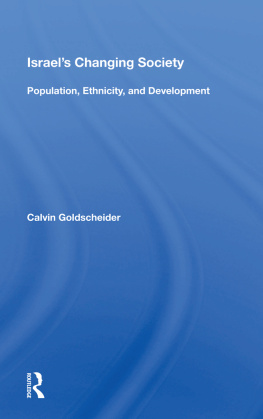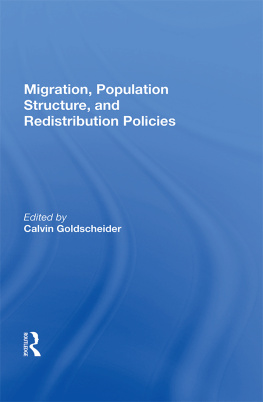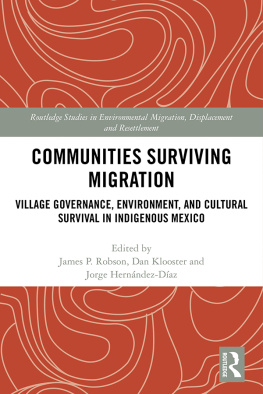
Rural Migration in Developing Nations
Westview Replica Editions
The concept of Westview Replica Editions is a response to the continuing crisis in academic and informational publishing. Library budgets for books have been severely curtailed. Ever larger portions of general library budgets are being diverted from the purchase of books and used for data banks, computers, micromedia, and other methods of information retrieval. Interlibrary loan structures further reduce the edition sizes required to satisfy the needs of the scholarly community. Economic pressures on the university presses and the few private scholarly publishing companies have severely limited the capacity of the industry to properly serve the academic and research communities. As a result, many manuscripts dealing with important subjects, often representing the highest level of scholarship, are no longer economically viable publishing projects--or, if accepted for publication, are typically subject to lead times ranging from one to three years.
westview Replica editions are our practical solution to the problem. We accept a manuscript in camera-ready form, typed according to our specifications, and move it immediately into the production process. As always, the selection criteria include the importance of the subject, the work's contribution to scholarship, and its insight, originality of thought, and excellence of exposition. The responsibility for editing and proofreading lies with the author or sponsoring institution. We prepare chapter headings and display pages, file for copyright, and obtain Library of Congress Cataloging In Publication Data. A detailed manual contains simple instructions for preparing the final typescript, and our editorial staff is always available to answer questions.
The end result is a book printed on acid-free paper and bound in sturdy library-quality soft covers. We manufacture these books ourselves using equipment that does not require a lengthy make-ready process and that allows us to publish first editions of 300 to 600 copies and to reprint even smaller quantities as needed. Thus, we can produce Replica Editions quickly and can keep even very specialized books in print as long as there is a demand for them.
About the Book and Editor
Rural Migration in Developing Nations: Comparative Studies of Korea, Sri Lanka, and Mali
edited by Calvin Goldscheider
What is the relationship between migration and rural social structure? How does the selective movement out of rural areas affect the economic and social conditions of migrants, their families, and their places of origin? Addressing these and other questions, the contributors to this book consider rural migration patterns in the context of social change and economic development in three less developed nations: Korea, Sri Lanka, and Mali. Through comparative analysis the authors reveal both the diversity and the cross-national similarities of rural migration, offering theoretical bases for its interpretation and pointing to policy implications for developing areas.
Calvin Goldscheider is affiliated with the Population Studies and Training Center and is adjunct professor of sociology at Brown University. Dr. Goldscheider is the editor of Rural Migrants in Developing Nations: Patterns and Problems of Adjustment (Westview, 1983).
Published in cooperation with The Population Studies and Training Center, Brown University
Rural Migration in Developing Nations
Comparative Studies of Korea, Sri Lanka, and Mali
edited by Calvin Goldscheider
with contributions by
Dayalal S. D. J. Abeysekera
Jin Ho Choi
Calvin Goldscheider
Robert E. Mazur
and Foreword by
Sidney Goldstein
First published 1984 by Westview Press
Published 2019 by Routledge
52 Vanderbilt Avenue, New York, NY 10017
2 Park Square, Milton Park, Abingdon, Oxon OX14 4RN
Routledge is an imprint of the Taylor & Francis Group, an informa business
Copyright 1984 by Taylor & Francis
All rights reserved. No part of this book may be reprinted or reproduced or utilised in any form or by any electronic, mechanical, or other means, now known or hereafter invented, including photocopying and recording, or in any information storage or retrieval system, without permission in writing from the publishers.
Notice:
Product or corporate names may be trademarks or registered trademarks, and are used only for identification and explanation without intent to infringe.
Library of Congress Cataloging in Publication Data
Main entry under title:
Rural migration in developing nations.
(A Westview replica edition)
1. Rural-urban migration--Developing countries. 2. Urban-rural
migration--Developing countries. 3. Developing countries--Rural conditions.
I. Goldscheider, Calvin
HB1955.R87 1984 304.8'09172'4 84-2269
ISBN 13: 978-0-367-28635-4(hbk)
To Robert G. Burnight Kurt B. Mayer Vincent H. Whitney
Reflecting the major attention given by Brown University's Population Studies and Training Center to problems of population movement and urbanization in developing countries, the Center initiated a Comparative Urbanization Project in 1972-73. Funded by a Ford Foundation Grant to the Center, the first objective was to pursue research on questions associated with urbanization, migration, and development in less developed nations.
The program sponsored a non-credit seminar in which an average of 12 trainees participated each year. This seminar served several purposes. First, its discussions identified research interests common to both the faculty and the student seminar participants. Growing out of the interest in the adjustment of rural-to-urban migrants, the seminar developed a set of core questions and sampling designs for use in field surveys in developing countries. It was expected that a small number of the trainees participating in the seminar would, in fact, undertake such field studies, focusing on the adjustment of migrants to big cities in less developed nations. The studies were intended to give the individual trainee experience in field work and to provide the trainee with data for a dissertation. Moreover, a body of comparative data would be compiled whose analysis would allow better insights into what demographic characteristics distinguish migrants from non-migrants, whether these characteristics affect adjustment in the urban area, and what implications the adjustment process has for the urban areas in which the migrants take up residence.
Under the Ford Foundation Grant, the Center funded four trainees during 1973-1977 to undertake field surveys as the basis for their doctoral dissertations. The field operations, encompassing approximately 750 households in each location, were completed in Seoul, Korea; Surabaya, Indonesia; Bogota, Colombia; and Tehran, Iran. These four projects provided the core studies of the first monograph in this series, Urban Migrants in Developing Nations: Patterns and Problems of Adjustment.
Fuller understanding of the relations between migration and urbanization, however, requires attention to assessing migration from the perspective of the rural origins of migrants to cities, as well as an urban perspective. It is important to gain insights on who out-migrates and why, as well as on who stays; to study the large movement that occurs in many countries between rural places; and to assess the return migration from cities that is a common experience of many rural to urban migrants. Growing out of this recognition, the two field studies initiated during 1977-78 in the Comparative Urbanization Project focused on rural areas. One was conducted in southern Korea with independent support from the Ford-Rockefeller Program; it involved surveys in three rural locations covering the determinants and consequences of urban to rural return migration. The second study, undertaken in Sri Lanka, was an assessment of rural resettlement programs; sample surveys, conducted in both the dry zones of destination and the wet zones of origin, allowed assessment of the adjustment of migrants and the impact which their out-migration had on the place of origin. A third project, utilizing data collected in Mali by the Department of Agricultural Economics at Purdue University under sponsorship of USAID, focused on interrelations between rural socioeconomic structure and migration; particular attention was given to factors affecting labor allocation. Again, each of these studies constituted the investigator's doctoral dissertation. These three rural-focused studies now provide the basis for this second monograph emanating from the Comparative Urbanization Project.






